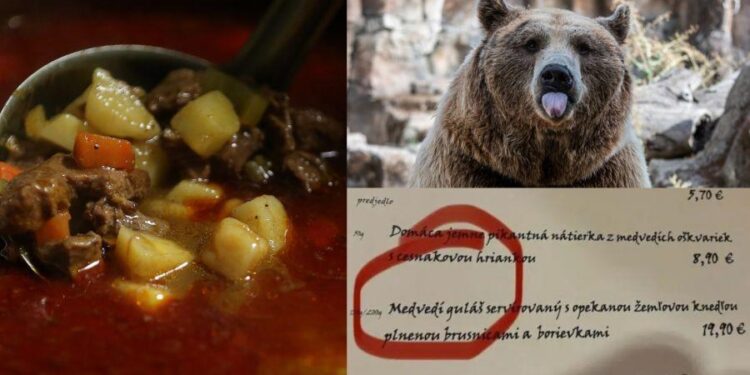Slovakia has taken a novel step in wildlife management and food regulation by permitting the commercial sale of meat from culled bears, marking a unique development in Europe’s approach to sustainable hunting practices. The decision, announced recently, allows hunters to sell bear meat legally, transforming what was once a strictly controlled byproduct of population control into a marketable commodity. This move sparks debate over wildlife conservation, consumer safety, and ethical hunting, as Slovakia positions itself at the intersection of tradition, ecology, and economic opportunity.
Slovakia Opens Market for Culled Bear Meat to Boost Local Economy
Slovakia has introduced a pioneering initiative to commercialize culled bear meat, aiming to invigorate rural economies and create new opportunities within the country’s hunting and food industries. This move allows licensed hunters to sell meat from bears culled under regulated wildlife management programs, ensuring sustainable population control while generating income for local communities. The government emphasizes strict health and safety standards during processing to guarantee product quality, transforming a previously untapped resource into a marketable delicacy.
Key benefits of this policy include:
- Promotion of sustainable hunting practices aligned with conservation efforts.
- Support for rural entrepreneurship through new business ventures.
- Expansion of Slovakia’s culinary offerings with unique game meat.
- Reduction of waste by utilizing meat that was once discarded.
| Aspect | Details |
|---|---|
| Meat Certification | Mandatory health inspection |
| Hunting Quotas | Strictly regulated to protect populations |
| Market Availability | Local butchers and specialty stores |
| Economic Impact | Projected increase in rural revenues by 10% |
Health and Safety Protocols Ensured in Bear Meat Consumption
The Slovak authorities have established rigorous standards to ensure the safety of bear meat introduced into the market. All culled bears undergo mandatory veterinary inspections to detect any signs of disease or contamination before the meat is approved for sale. These inspections include detailed testing for parasites such as trichinella, crucial given the carnivorous nature of bears, which increases parasite risk. Meat suppliers must also adhere to strict hygiene protocols during transportation and storage to prevent spoilage or bacterial growth.
Consumers can have confidence in the product’s safety as the government enforces transparent labeling requirements, providing details about the origin, date of culling, and health certification on packaged bear meat. Additionally, official cooking recommendations highlight minimum safe internal temperatures to eliminate harmful pathogens. Quality control measures are supported by a system of spot-checks and sampling by food safety agencies throughout the supply chain, ensuring compliance and protecting public health.
- Mandatory veterinary health certificates for all culled bear meat
- Trichinella testing prior to market release
- Strict hygiene measures during handling and transport
- Clear labeling with origin and safety info
- Government-recommended cooking guidelines for consumers
| Safety Measure | Description |
|---|---|
| Veterinary Inspection | Checks for disease and parasites |
| Trichinella Testing | Essential parasite screening |
| Labeling | Includes origin and health details |
| Cooking Guidelines | Instructions for safe consumption |
Experts Advise Consumers on Sustainable and Ethical Bear Meat Practices
Specialists in wildlife management and food safety emphasize the importance of responsible sourcing and consumption when it comes to bear meat now legally available in Slovakia. They recommend that consumers prioritize products from licensed hunters and certified butchers to ensure traceability and compliance with health regulations. Strict adherence to proper handling and preparation techniques is vital to prevent risks associated with zoonotic diseases and to respect animal welfare standards.
Additionally, ethical considerations highlight the need for transparency throughout the supply chain. Experts encourage buyers to support sustainable hunting practices that align with population control efforts, ensuring the species’ long-term stability. Key sustainable and ethical guidelines include:
- Verify hunting permits and the origin of the meat
- Insist on rigorous health inspections before purchase
- Choose local supply chains to reduce carbon footprint
- Acknowledge cultural and ecological impacts of bear hunting
| Practice | Purpose |
|---|---|
| Certified sourcing | Ensures legal and ethical origin |
| Health inspections | Prevents foodborne illnesses |
| Population control | Maintains ecological balance |
| Local procurement | Supports community economies |
The Way Forward
As Slovakia moves forward with the controversial decision to permit the sale of culled bear meat, the initiative underscores the country’s unique approach to wildlife management and sustainable resource use. While proponents argue it offers economic benefits and supports population control, critics caution against potential ethical and ecological implications. This development marks a significant chapter in the ongoing dialogue on balancing conservation priorities with local livelihoods, reflecting broader debates across Europe on how best to manage natural resources from forest to fork.
















